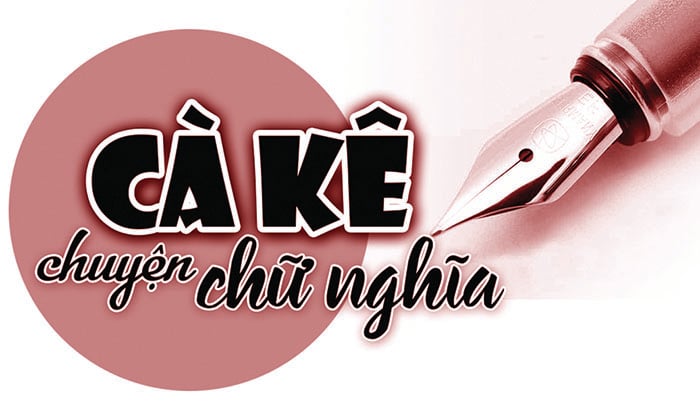"I am one of those who persistently speak out to help preserve the purity of the Vietnamese language, but I have also often felt helpless and frustrated by the conservatism, stubbornness, and... cowardice of some people who see their mistakes but dare not correct them. Today I encountered another such case."
The parents of my child's classmates prepared a small gift, a water bottle, for their children on graduation day.
The design, color, and even the inscription on the vase were agreed upon by the homeroom teacher and the students. However, when the class's Parent Representative Committee posted the image to the class's Zalo group for parents, I discovered that the inscription "School Year 2022-2025" was inaccurate. "School year" refers to a single academic year; no school year lasts three years. The word "Course" should be used instead.
However, despite my suggestions, the Head of the Parents' Association insisted on keeping the term "School Year," arguing that these words were created by the teacher, and it would be inappropriate to see them changed upon receiving the report.
[...]
I'm sure the teacher didn't pay attention to those words, and omitting the word "Year" wouldn't offend him or make him think twice; in fact, he'd be even happier because the gift was thoughtfully given by the parents.
The story made me sad not only for the Vietnamese language...[...]".
Could the "Casual Conversations on Words" column please tell us whether the analysis of the two words "yearly course" by the aforementioned parent is correct or incorrect?
Thank you very much.
Answer: Actually, the issue is not as simple as the parent above thinks.
"Niên khóa" (年課) is a Vietnamese word of Chinese origin, originally unrelated to learning or schooling, but rather meaning the tax collected over a year. The character "khóa" (課) here means tax or tax (for example, "diêm khóa" = salt tax; "thước khóa" (稅課 = taxes in general).
The character 課 in the word "tax" also means teaching or learning. Therefore, in Chinese, "lesson" means lesson. In Vietnamese, the character 課 is used with two meanings (excerpt from the Vietnamese Dictionary - Hoang Phe-Vietlex): "1 - the time allotted for a term of office," for example, "serving as chairman for two consecutive terms"; "2 - the time allotted for completing a general training or educational program," for example, "completing a training course ~ two people studying in the same course."
Regarding the term "yearly schedule," the dictionary definitions are inconsistent. For example:
- The Vietnamese Dictionary (by Le Van Duc) defines "yearly course" as "annually calculated course" and gives the example "Studying according to the academic year; budget belonging to the academic year 1966-1967".
- The Vietnamese dictionary (edited by Hoang Phe - Institute of Linguistics) defines "nien khoa" as "school year," synonymous with "school year."
- The Vietnamese Dictionary (edited by Văn Tân) defines "year of study" as "the time it takes to complete a class" and gives the example "the year of study begins in September and ends in June of the following year".
However, the Vietnamese Dictionary (edited by Hoang Phe – the version with Chinese characters for Sino-Vietnamese words from the Vietlex Dictionary Center) defines “niên khóa • 年課” as “a course of study, calculated from the beginning year to the end year”, and gives the example “students of the 2020-2023 academic year”. Therefore, the inscription “Niên khóa 2022-2025” on the aforementioned commemorative vase is not incorrect.
So, how do we interpret the parent's argument that "Academic year refers to a single school year, therefore no academic year lasts three years. The word 'course' should be used here"? Actually, the word "year" here doesn't necessarily have to be understood as a single year. For example, "term" refers to a time limit, defined in years, for a job, right, or obligation, while "academic year" can be understood as a course of study, from its beginning to its end (encompassing multiple years).
As mentioned above, the Chinese term "niên khóa" originally referred to the tax revenue for a year. To refer to the school year, the Chinese word for "school year" (學年) is used. The term "school year" was also used in Vietnamese with a similar meaning to its Chinese counterpart, and is recorded in many Vietnamese dictionaries, such as the Vietnamese Dictionary (Hội Khái trí Tiến đức), which defines "school year" as "school year" and gives the example "School years in schools have ten months" (the two words "school year" are derived from "niên học").
Thus, in practice, the word "year" is used with two meanings: 1. referring to a school year; 2. referring to a course of study. However, the Vietnamese Dictionary (edited by Hoang Phe – Vietlex edition) only recognizes "year of study" as a course of study calculated from the beginning to the end year.
In practice, although the term "academic year" is used with two meanings, it usually doesn't cause misunderstanding because it's associated with the number of years. For example, to refer to an academic year, one would write "Academic Year 2024-2025"; and to refer to a multi-year course, a number would also be included, for example, "Academic Year 2020-2023," as illustrated in the Vietnamese Dictionary (Hoang Phe-Vietlex). However, in our opinion, if referring to the time spent at school, from the opening day to the summer break, sufficient to complete a grade, then the term "academic year" should be used; while to refer to the time allotted for completing a general learning or training program, the terms "course," "course of study," or "academic year" should be used.
Man Nong (Contributor)
Source: https://baothanhhoa.vn/nien-khoa-va-nbsp-nam-hoc-251527.htm







![[Photo] Enchanted by the deciduous forest during the leaf-changing season.](/_next/image?url=https%3A%2F%2Fvphoto.vietnam.vn%2Fthumb%2F1200x675%2Fvietnam%2Fresource%2FIMAGE%2F2026%2F02%2F04%2F1770196861704_2066642_8ffd5f25c3c9433be0e644abe71613ae.jpeg&w=3840&q=75)

























































![[Photo] Prime Minister Pham Minh Chinh presides over the regular Government meeting in January 2026.](/_next/image?url=https%3A%2F%2Fvphoto.vietnam.vn%2Fthumb%2F402x226%2Fvietnam%2Fresource%2FIMAGE%2F2026%2F02%2F04%2F1770209446450_hopcp-jpg.webp&w=3840&q=75)
































Comment (0)